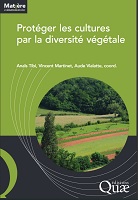Protéger les cultures par la diversité végétale
Contributor(s)
Tibi, Anaïs (editor)
Martinet, Vincent (editor)
Vialatte, Aude (editor)
Language
FrenchAbstract
The advent of synthetic fertilizers and pesticides has enabled farmers to free themselves from environmental constraints that limit yields, and has been accompanied by a simplification of agricultural plots and landscapes. The environmental and health impacts of this dominant model, as well as its interrelations with climate change and the erosion of biodiversity, are now well established by the scientific community.
Society is increasingly demanding a form of agriculture that meets food needs while respecting the environment and human health, but the transition of farming systems is insufficiently underway. The lack of effective alternatives to synthetic pesticides to protect crops is cited as one of the reasons for this inertia.
This collective scientific appraisal takes stock of crop protection strategies based on plant diversification in agricultural plots and landscapes, and analyzes the obstacles and levers to their deployment. It is part of the ""Research-Innovation"" axis of the Écophyto 2+ plan, which supports the production of the knowledge and tools needed to reduce the use of synthetic pesticides.
The book is aimed at teachers, researchers and students, as well as players in the agricultural world, land managers, environmental organizations and associations, and any citizen interested in these issues.


 Download
Download